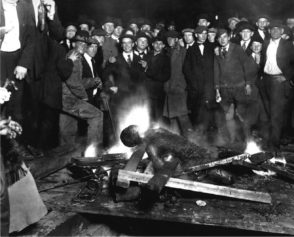These days, the Republican Party is talking more about race, in a season — particularly a campaign season — in which the debate over the Confederate flag is providing white Southerners an opportunity, should they choose to accept it, to look at themselves. And for white Americans in general, this is a chance for them to understand and acknowledge white skin privilege and white supremacy.
It is within this context, and the moment in which the nation finds itself, that the Republican Party has embarked upon a new outreach program to the Black community. The question is whether the party is able to attract Black voters in any significant numbers without acknowledging racism and white supremacy in America, and in its own party.
Called #CommittedToCommunity, the Republican initiative — a collaboration with Black media outlet Radio One — is a voter mobilization campaign designed to recruit and engage Black voters for the 2016 campaign through events, activities and forums in communities of color. The campaign kicked off in Ohio, and will involve a Radio One ad campaign in Cincinnati, Cleveland and Columbus. Cleveland is the site of the 2016 Republican National Convention.
RNC Chairman Reince Priebus said his party is engaging every voter, and taking no one for granted. “For too long, some have peddled the idea that only one party cares about communities of color. Not true. We have stepped up our ground game in communities of color,” Priebus said. “Expect to see more RNC staff in diverse communities, discussing our shared values and actively recruiting people from across the country. Voters will hear from us often and in black media outlets like Radio One to share our message, mobilize new activists and ask for their vote.”
“The RNC wants to tell its story to the African-American community. Radio One reaches 82 percent of black Americans with our television, radio and digital multi-media platforms,” said Alfred C. Liggins, CEO of Radio One. We view ourselves as the link to our audience. Our reach, relationships with black churches, organizations, entertainers, and our unique understanding of our primary audience makes us a high-value partner to organizations like the RNC. We want the black electorate to be as informed as possible going into the 2016 election season.”
Meanwhile, at the National Press Club, presidential hopeful and former Texas Gov. Rick Perry began a speech by discussing the 1917 lynching of a Black 17-year-old named Jesse Washington, an “unimaginable horror” as Perry described it. “We cannot dismiss the historical legacy of slavery, nor its role in causing the problem of black poverty,” Perry said. “And because slavery and segregation were sanctioned by government, there is a role for government policy in addressing their lasting effects.”
As Francis Wilkinson explained in The Chicago Tribune, rarely have Republicans talked about lynching, racism or discrimination, so the Perry speech is promising. Calling Republicans “cafeteria conservatives,” the Bloomberg View writer argued that the party will say whatever suits their present tastes, whether it is failing to acknowledge their own Southern Strategy of appealing to white racial fears for political gain, or recasting the GOP as the party that saved the South from the Confederate flag and racist Democrats “research shows a Republican base both eager to deny that racism is a significant factor in American society and prone to ‘explicit anti-black attitudes,’” notes Wilkinson. “When blacks gained civil rights protection in 1964, after more than three centuries of brutalization, millions of white Americans concluded that whites were the true victims, abused by federal power. Those resentments have eased, but they endure.”
There are other signs of a party that is at least beginning to address the issue of racism. For example, in a departure from his past statements against civil rights, Sen. Rand Paul has focused on the problems of the criminal justice system and its impact on people of color, and conservatives and liberals have formed coalitions for reform of the prison system and mass incarceration. As the Republican Party seeks more diversity — and it must in order to survive, in a nation where the majority of the babies born are children of color — it needs to have more uncomfortable discussions, as in the case of immigration, xenophobia and outreach to Latinos. And the GOP needs more leaders such as Jenny Horne, the South Carolina state representative whose passionate plea to remove the Confederate flag provided a rare example of a white person — and a white Republican — speaking out against racism.
The fight within the Republican Party continues. As the Republican hierarchy called for the removal of the Confederate flag, the GOP has shown an unwillingness to depart from white supremacist policies. House Republicans yanked a spending bill from the floor because some of its Southern members threatened to derail the process if amendments limiting the flying of the Confederate flag on federal property were not removed.
North Carolina is ground zero for the struggle for Black voting rights, where the NAACP and the Moral Monday movement is challenging the state’s voter restriction law, which Gov. Patrick McCrory signed into law and is expected to have a chilling effect of Black voting rights. The North Carolina measure, which includes such controversial measures as banning same-day registration, voter drives targeted at young people and reduction of early voting days, is only one example of voter suppression efforts enacted by 21 states in five years, most of them in time for the 2016 election.
Meanwhile, South Carolina Gov. Nikki Haley — who is an Indian American of Sikh heritage and, therefore, not white — has been characterized in The Washington Post as a leader of the New South for her stance against the Confederate flag on the state Capitol grounds. In addition, she faced both praise and racial attacks for her decision to call for the removal of the flag. And yet this GOP leader who was elected as a darling of the tea party still appears to toe the line for white supremacists in the base of her party by supporting voter ID measures that target Black people.
The GOP outreach effort to Black people is a positive sign, but there is more work to be done within the ranks of the Republican Party. And although in a former life the Republicans were the party of abolition, the Reconstruction Amendments and the Freedmen’s Bureau, that was a long, long time ago. Before the GOP can have its coming to Jesus moment on race, it must grapple with white supremacy.


